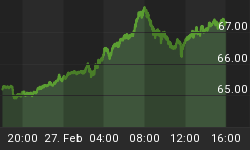Steady nerves needed for short-term speculators in precious metals...
Double-whammy for gold and silver prices.
First, new US Federal Reserve chairwoman Janet Yellen hinted that Dollar interest rates may rise earlier than analysts thought. "Fed's new rate forecasts signal endgame for easy money," reckons the Financial Times.
Believe it when we see it. Slowly raising US Dollar rates from record-low rates in 2004-2006 blew the economy up in 2007. Europe today stands on the edge of deflation. And near-zero rates are here to stay, Yellen stressed. And stressed again.
But everything except the US Dollar sank after Yellen spoke in Washington, with hard-money gold and silver leading the way. Because they don't pay any interest at all. So they are the most sensitive assets to changes in interest-rate expectations, however slight.
Second, in an interview quoted by the Wall Street Journal, German Bundesbank policy-maker Carl-Ludwig Thiele says Eurozone central banks are "discussing" the future of their 15-year old cap on gold sales.
This might matter. The burden of feeding the gold flow from West to East, which maps the transfer of wealth and economic power more broadly, has shifted to private stockpiles since the financial crisis. Because Western central banks have suspended their sales.
Their 1999 agreement to pre-announce sales, with a definite cap on annual sales (first of 400 tonnes, then 500...and then 400 again), helped stem gold's 20-year decline. That cap, known as the Central Bank Gold Agreement, was forced by the UK's disastrous sales announcement of June 1999. Since the financial crisis starting 2007 it has become pointless, as sales have fallen to zero anyway. Because countries in crisis don't sell gold. Not unless they want to admit things are truly catastrophic.
But as crisis recedes, memories grow short.
"The negotiations are still ongoing," says Thiele at the Bundesbank. The German central bank never did sell any gold, either before or after the CBGA.
But "No one can see into the future," he says, "and therefore it is currently under discussion whether it should be continued."
The current 5-year CBGA is due to expire in September. Signing a fourth, with only 203 tonnes sold since 2009 out of a possible 2,000, would frankly look silly. But not signing might spook the market, especially those older hands who recall the disaster of Brown's Bottom.
Certainly looks to be spooking them today. Steady nerves needed for short-term speculators in precious metals.















